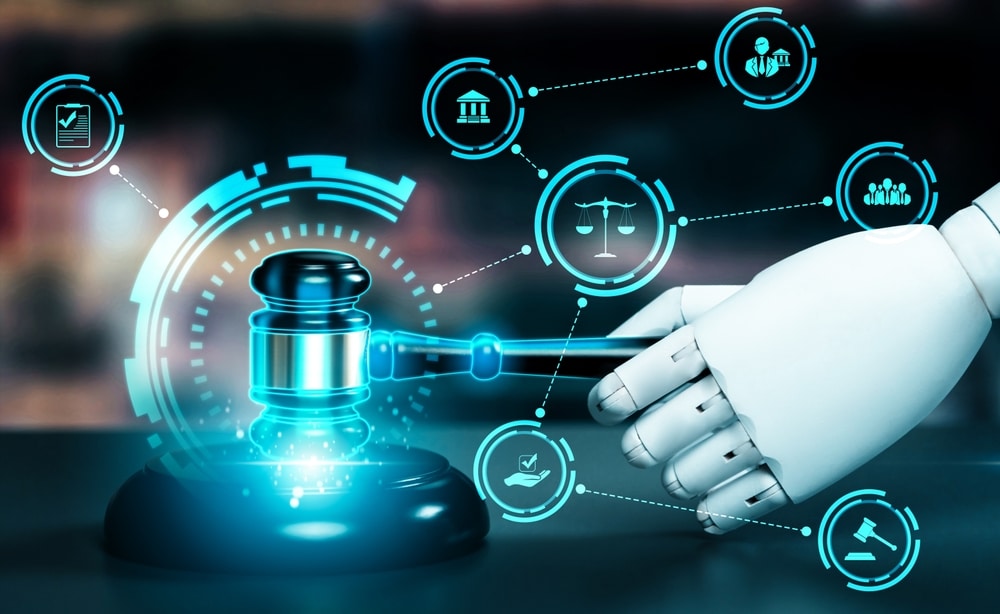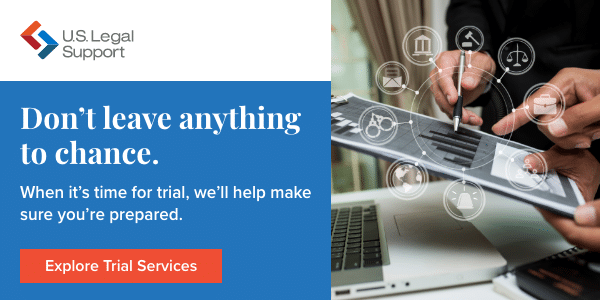AI in Legal Discovery and Research

The buzzword of “artificial intelligence” (AI) is everywhere. And in the legal industry, it’s being touted as the breakthrough we’ve been waiting for to revolutionize how legal research and discovery are performed.
In reality, it’s not entirely new to the legal profession. AI and other forms of legal technology have been ramping up for at least a decade, with successful deployment by corporations, government agencies, and legal teams for eDiscovery (electronic discovery).1
With its explosive growth over the past few years, there are more AI tools and options available to attorneys that help simplify and expedite discovery (differentiating themselves from simply outsourcing to eDiscovery firms). Investing time now to build generative AI into your discovery processes has the potential to produce better results in less time. As with any new technical implementation, utilizing AI can come with a learning curve. Even still, those familiar with the nuances of other technologies will likely find that pushing through the complexities can pay dividends for you and your firm.
Introduction to AI in Legal Discovery
What exactly can AI do for your discovery process? Legal discovery can be time consuming, especially when it comes to complex cases. Wading through content that may or may not be useful takes time, attention, and recall.
AI can help perform discovery functions including1,2:
- Automate data collection, processing, and review
- Craft summaries of legal documents or data sets
- Review electronically stored information (ESI): devices, cloud, systems, social, public, etc.
- Identify unexpected patterns and connections within data
- Present clustered data in interactive visual charts
- Assess and label photos
Plus, the ability to respond to input and learn from experience and feedback means that AI can:
- Respond to human-language inquiries about results via a ChatGPT-type interface3
- Refine search patterns and results
- Conceptually cluster relevant data through machine learning algorithms
- Seek new ESI based on those identified as relevant by the legal team
- Assign relevance scores to files, adapt scores following input, and refine algorithms
- Learn and adapt not only within a specific case but also to future projects
- Adopt firm-specific guidelines and direction
How AI Enhances Legal Work
Investing in new technology should pay for itself down the line, typically with a combination of efficiency gains, cost reductions, increased billable time, and/or service offerings that increase firm profit. With the time saved with AI tools, your team has the space to delve into more strategic aspects of legal work that require more attention, like interrogatory or deposition testimonies.
AI can help with:
- Speed and efficiency – In addition to data collection and review at a higher speed than humans, AI tools can collect, retain, and target data more efficiently. Plus, using your staff for strategic work rather than document review can lead to more time for billable activity. Deloitte has found that simply applying machine learning algorithms to research can reduce review time by up to 40%.2
- Increased accuracy and reliability – AI can scan thousands of sources and files and return summaries, outlines, connections, and suggestions for further inquiry. It bypasses individual human error from fatigue, bias, or lack of engagement.
- Predictive analytics – AI can help identify emerging compliance and regulatory issues, legal risks, potential conflicts of interest, and contract concerns. It can analyze past legal cases by multiple similarities to predict outcomes, and even provide legal insights.4
- Redeployment of staff – Most jobs require a range of skills, from basic administrative tasks to highly trained knowledge. Removing the initial stages of research and review from your team’s to-do lists allows them to spend their time on targeted research, decision-making, and follow-up for more effective legal strategy and hands-on discovery steps.
Practical Applications of AI in Legal Discovery & Research
AI has already been seamlessly integrated into many of the systems and resources used by legal teams today. This includes legal research services and other AI-enhanced tools that can5,6:
- Deliver better search results with semantic understanding vs. keyword input
- Analyze drafts to provide insights, suggestions, and relevant citations or authorities
- Identify relevant case, including those that have been overturned
- Locate related cases that have been cited in tandem with those relevant cases
- Combine supervised and unsupervised learning to discover evidence with limited scope
AI has also been leveraged to enhance research related to the key players in your case:
- Judges – Insight on behavioral patterns, preferences, and habits
- Opposing counsel – Firm and individual experience, success factors, and connections
- Your team – Preview what opposing counsel may find based on similar AI-driven research
When it comes time to leverage research for depositions, AI can augment preparation. AI’s role in deposition preparation may include:
- Creating outlines of key case issues and subjects, varying the outlines based on the differences in a deposition vs. testimony, for example
- Drafting deposition questions and issues to cover for each witness7
- Anticipating case weaknesses and draft potential opponent questions and tactics
Overcoming Challenges with AI
Adding tools and practices to improve deposition preparation doesn’t come without cost and preparation. You’ll need to take steps related to:
Data Privacy Concerns
Lawyers must take reasonable steps to protect client information and promote data security. In relation to AI technology and tools, this includes how information is:
- Transmitted during use
- Saved or stored at various levels (i.e., in a user account vs. a multi-client platform level)
- Shared with third parties
- Destroyed or deleted
An important way AI reduces both data privacy and cyber security issues is by more tightly targeting relevant information and avoiding over-collection. This results in:
- A smaller set of documents to retain, store, and protect
- Less legal and regulatory exposure
- Better information governance
Additionally, AI tools can find and redact personal or attorney-client privileged information to maintain confidentiality or anonymity when appropriate.2
Training and Implementation
There’s no getting around it—change is uncomfortable, and even frightening for some. You may need to address reluctance in:
- Your team to adapt to new practices and potential concerns about being out of a job
- Partners or management to invest time and funds
- Clients concerned about accuracy, security, or why they should pay for services
Importance of AI Guardrails and Human Oversight
The sweeping changes that AI promises come with concerns that early adopters, as well as legislators and courts, have recognized. The American Bar Association’s Model Rules of Professional Conduct can be applied to the use of AI, and some states have additional guidance and regulations. Lawyers should:
- Understand the benefits and risks of relevant technology
- Have reasonable expectations related to accuracy
- Understand both the input and output (errors, biases, data quality, etc.)
In recent years, there have been several amendments to the Federal Rules of Civil Procedure (FRCP) which govern U.S. civil litigation that pertain to AI.1
Practitioners can also look to the Electronic Discovery Reference Model (EDRM) for guidance, education, and practical resources related to using AI in eDiscovery software ethically and responsibly.8 Their continually updated infrastructure and tools are used by law firms, corporations, government organizations, and individuals in 145 countries.
Perhaps the most important aspect of utilizing AI in legal discovery is human oversight. Firms should have processes in place to ensure that any work developed or supplemented by AI is reviewed for accuracy.
The Future of AI in Legal Discovery
As AI and its use in legal discovery continue to be developed and refined, there are both challenges and additional benefits to look forward to. Expect to see:
- Skill set changes – AI is only as effective as its human partners’ input and guidance. Legal professionals will need to learn how to craft and guide generative AI prompts, identify biases, and evaluate output accuracy and relevance. At the same time, incoming employees will skip past the manual discovery work that previously helped them learn, requiring new ways to train new associates and paralegals.
- More regulations – Challenges in court, industry regulations, jurisdictional requirements—expect to see more guidance and rules from multiple sources about how to ethically interact with, document, and utilize AI for legal purposes, particularly when it comes to personal data.1
- Billing changes – If AI research significantly cuts down time, how does that affect a billable hours model? With these changes, firms and professionals can switch to value-based billing that reflects expertise and results rather than hours spent.
- Realtime results – Playing catch-up with opposing counsel’s unexpected arguments or questions through online legal research is the tip of the iceberg. An AI deposition assistant that can craft deposition questions and identify odd witness behavior in realtime is reportedly in development by the law firm Sullivan & Cromwell.9
U.S. Legal Support Can Help
Our history of supporting legal industry partners since 1996 provides our foundation, but U.S. Legal Support is a company with an eye on the future. That starts with cybersecurity protocols in place to protect your documents and sensitive case and client data, and extends to the range of services we offer, including remote depositions, record retrieval and analysis, interpreting and translation services, and litigation consulting.
At the heart of our services is a nationwide network of more than 5,000 experienced court reporters, up-to-date on current technology and practices within the legal industry.
Whether you’re a solo practitioner or part of a top law firm, we offer unparalleled support for all legal practice sizes and types.
Learn more today about how we can help with your discovery and other litigation support needs.
Sources:
- Law.com by ALM Global, LLC. How Agencies, Legal Teams and Corporations Are Safely Using AI for E-Discovery to Reduce Costs and Accelerate Time to Resolution. https://www.law.com/legaltechnews/2023/12/14/how-agencies-legal-teams-and-corporations-are-safely-using-ai-for-e-discovery-to-reduce-costs-and-accelerate-time-to-resolution/
- Deloitte. Artificial intelligence and machine learning in e-discovery and beyond. https://www2.deloitte.com/ch/en/pages/forensics/articles/AI-and-machine-learning-in-E-discovery.html
- Lawyer Monthly. What Are the Practical Use Cases for Generative AI in Legal? https://www.lawyer-monthly.com/2023/05/what-are-the-practical-use-cases-for-generative-ai-in-legal/
- Cacti Global on LinkedIn. Legal Decision-Making with Predictive Analytics. https://www.linkedin.com/pulse/legal-decision-making-predictive-analytics-cactiglobal/
- American Bar Association. Law Bots: How AI Is Reshaping the Legal Profession. https://www.americanbar.org/groups/business_law/resources/business-law-today/2022-march/law-bots-how-ai-is-reshaping-the-legal-profession/
- Thomson Reuters Legal. The evolution of legal research. https://legal.thomsonreuters.com/blog/the-evolution-of-legal-research/
- Casetext Inc. 4 steps to acing your next deposition, using AI. https://casetext.com/blog/4-steps-to-acing-your-next-deposition-using-ai/
- EDRM. Welcome to EDRM. https://edrm.net/
- Multiplatform.ai. Artificial Intelligence Revolutionizing Deposition Preparation in Legal Practice. https://multiplatform.ai/artificial-intelligence-revolutionizing-deposition-preparation-in-legal-practice/
- Thomson Reuters. How will leveraging AI change the future of legal services? https://www.reuters.com/legal/legalindustry/how-will-leveraging-ai-change-future-legal-services-2023-08-23/

Editoral Policy
Content published on the U.S. Legal Support blog is reviewed by professionals in the legal and litigation support services field to help ensure accurate information. The information provided in this blog is for informational purposes only and should not be construed as legal advice for attorneys or clients.


